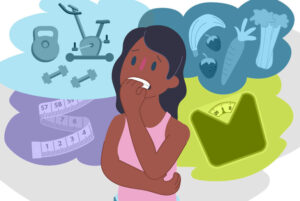
Many cultures around the world are preoccupied with food intake, body shape, appearance, and body weight, with the strong influence of fashion magazines, websites, fashion shows, television programs, and weight loss programs, which makes people desire a skinny body. This has created a multibillion-dollar business. Girls and boys during adolescence look up to celebrities and try to do things to be their size and shape.
Throughout history, we have seen the different beauty standards society has set for the ideal body, especially women. As society has become more fat-conscious, dieting and weight loss have become more common. We have reached a state where health is not a priority but body weight and shape are more valued.
Cognitive and behavioral factors
Cognition focuses on the understanding of thoughts, feelings, and behaviors that are attributed to a distorted body image, fear of fat, and loss of control over eating. People with eating disorders have a maladaptive belief system that filters their thinking associated with body images, weight, shape, and food.
Anorexia nervosa is strongly related to the fear of fatness and body image disturbances, which becomes the motivating factor that reinforces weight loss. Behaviors that enable an individual to achieve the desired weight are negatively registered in their mind, which makes them feel that they can reduce their anxiety about becoming fat. On the other hand, a person who is a perfectionist and has a sense of personal inadequacy may become more concerned with his or her appearance; they feel worthy only when they have the desired weight and body shape.
Criticism and bullying from peers and parents are also the leading factors in anorexia nervosa in teenage girls and boys.
Bulimia Nervosa and Binge – People with bulimia are also concerned with their overweight and body appearance. They also associate their self-worth with body weight and shape. They make efforts to control their eating behavior to make them feel better. They try a restricted pattern of eating that is rigid and strict on how much they should eat, what kinds of food they should eat, and when to eat. In some situations, these rules are broken, and they tend to binge on food, which is followed by purging and vomiting the food out. Stress and negative emotions can also make a person binge on food and later purge the food, believing that they will not gain any weight. Some of the other factors that could be contributing to eating disorders are personality influences, characteristics of families, and child abuse.
Treatment: Eating Disorders
Medications: Drug treatments are affective, and in some cases, there can be a co-morbidity of disorders that will require drug treatments. Medications will have side effects. However, dropping the drug treatment can cause a severe relapse. Medications can only be prescribed by a psychiatrist.
Psychological treatment : Therapy for anorexia is a two-tiered process. The immediate focus is to help the individual gain weight and essential nutrition that is required for the body to avoid medical complications and death. The person with anorexia is often so weak that their physiological functioning is disturbed, so operant conditioning behavior therapy programs are used and found to be moderately successful in helping the individual gain weight.
Family therapy is also an affective part of psychological treatment for anorexia to understand the interactions among members of the patient’s family and how they can be improved in treating the disorder.
In the case of bulimia nervosa, Cognitive-behavioral therapy (CBT) is best validated to be used to treat the disorder. CBT can help solve the problem of addressing wrong beliefs and distorted thinking. They are helped to see that a healthy body can be maintained without severe dieting and unrealistic restrictions on food intake. They also taught about assertive skills, which can help them cope with unreasonable demands placed on them by others. The major goal of the treatment is to help the individual develop a normal eating pattern.
CBT in the case of binge eating disorder focuses the individual on restrained eating by self-monitoring. Self-control and problem-solving skills are taught to deal with their circumstances and eating habits.
Share
Here to help
If you need help, Ananth Jeevan is here.
- Call our helpline (+91-9063-Jeevan) to talk to our counsellors
- Download the AJ App (on Android and AppStore )
- For Counselling appointments, use our WhatsApp number
Email Us
